
RailState: ‘DRZ Traffic Moving, Wildfire Threats Remain’ in B.C.
Written by Marybeth Luczak, Executive Editor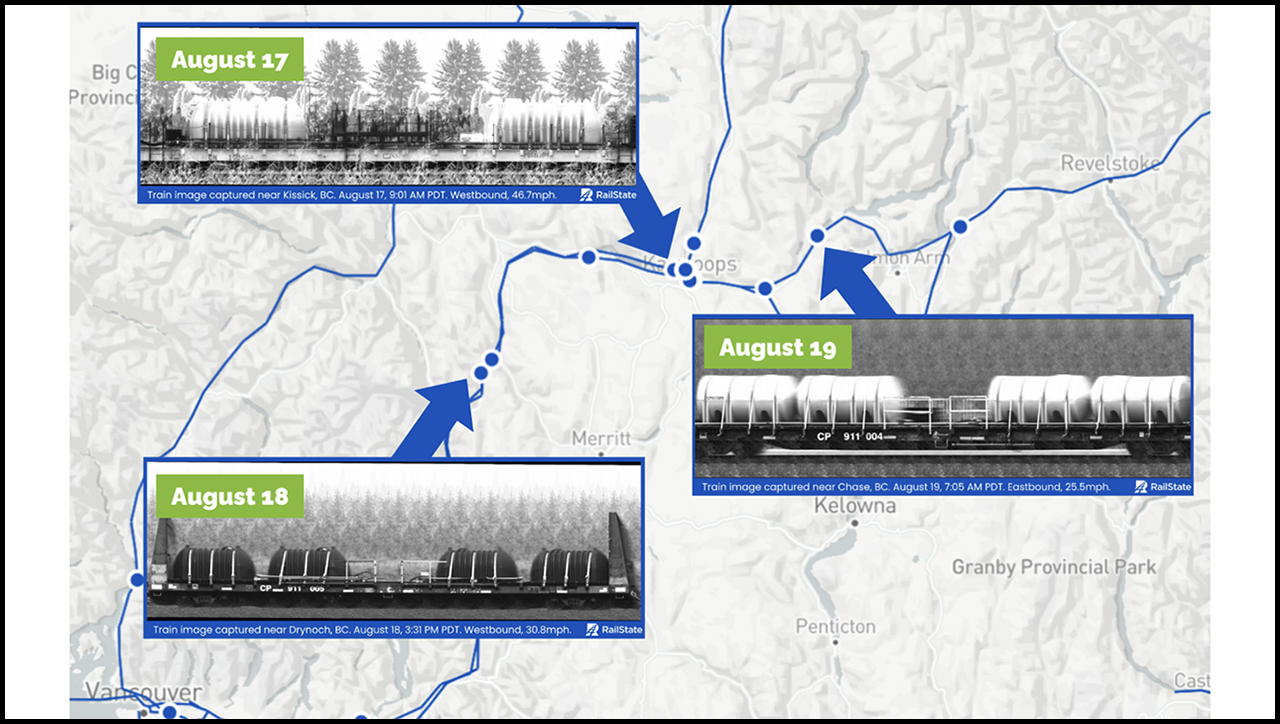
CN and CPKC have been regularly deploying fire suppression cars throughout B.C., according to RailState, whose sensors captured the train images above at Kissick, Drynoch and Chase during the intense wildfire activity over the past week.
CN and Canadian Pacific Kansas City (CPKC) trains traveling through the Fraser River Canyon Directional Running Zone (DRZ) were delayed a day or more due to the Aug. 18 Kookipi Creek Fire, and wildfire activity is contributing to other delays throughout the British Columbia region, according to real-time network visibility provider RailState, which independently tracks all freight movements across Canada.
“This was a short but significant delay and we’re seeing other wildfire-related delays in B.C.,” RailState Co-founder and Chief Commercial Officer John Schmitter said in an Aug. 24 report. “With wildfires intensifying, backlogs from the B.C. ports strike still remaining, and the looming grain harvest, the Canadian rail network is under a lot of pressure. For shippers with some optionality, it’s critical to know what’s going on and identify opportunities.”
Following is RailState-provided detail on how CN and CPKC handled the August 18 traffic interruption.
DRZ, Westbound Traffic Travel Times
Travel through the DRZ from Heffley (CN) and Monte Creek (CPKC) to Chilliwack typically takes less than a day, according to RailState. The time more than doubled as a result of the Aug. 18 shutdown.
For trains passing through Heffley on Aug. 17 and headed to the Port of Vancouver region, the travel time rose to nearly two full days, RailState said. Trains passing Monte Creek on that day saw travel times increase threefold from the expected travel time. While delayed, trains were held in the Kamloops area, according to RailState.
The average westbound travel time through the DRZ is now back to the normal range, the company reported.
“The most notable change in volume is in intermodal,” RailState said. “Westbound intermodal train volume increased by more than 1.5 trains per day during August 19-23 compared to the prior week.”
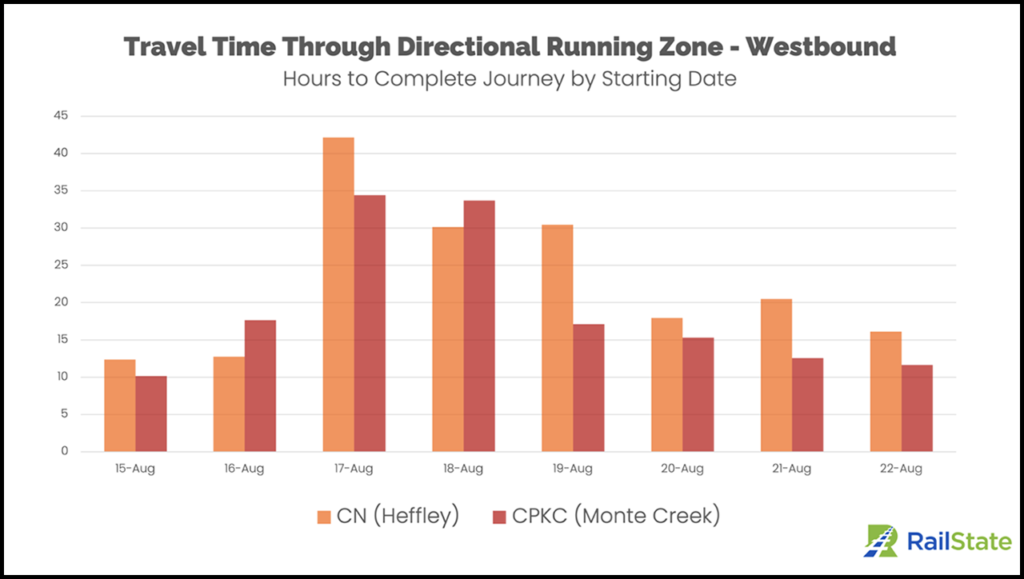
Commodity trains, on average, saw longer travel times than intermodal and manifest trains, according to RailState.
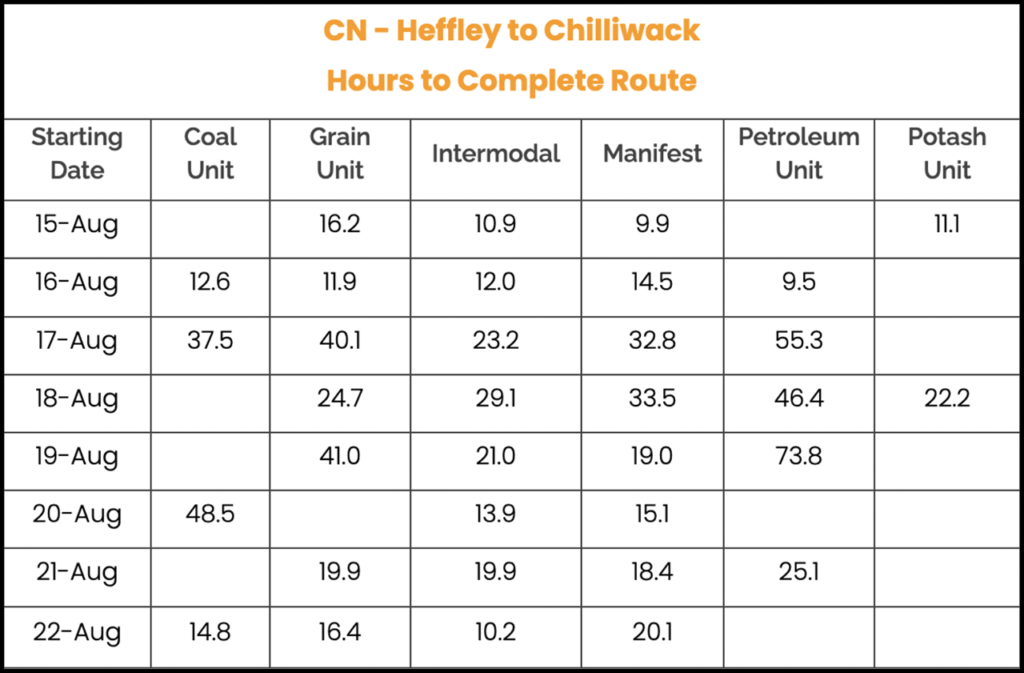
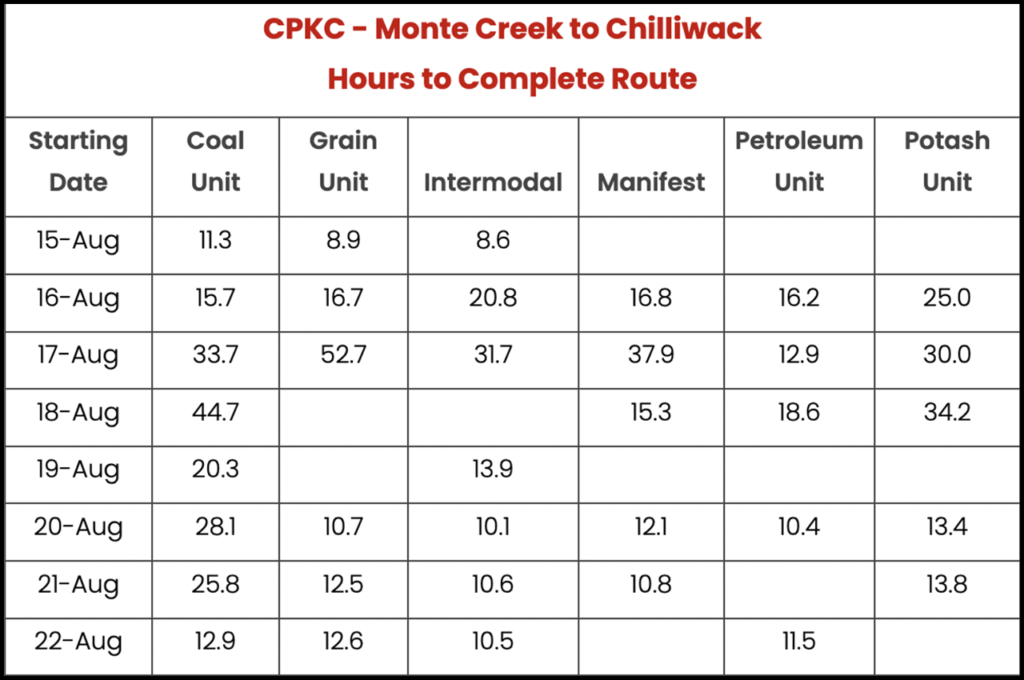
DRZ, Eastbound Traffic Travel Times
According to RailState, eastbound travel times did not increase as much as westbound travel times. The company said this is likely due to trains being held closer to Vancouver before entering the DRZ.
The largest change in eastbound volume is also in intermodal. There are an additional 1.3 trains per day carrying 389 more containers than the prior week, RailState reported; 83.8% of these containers are international.
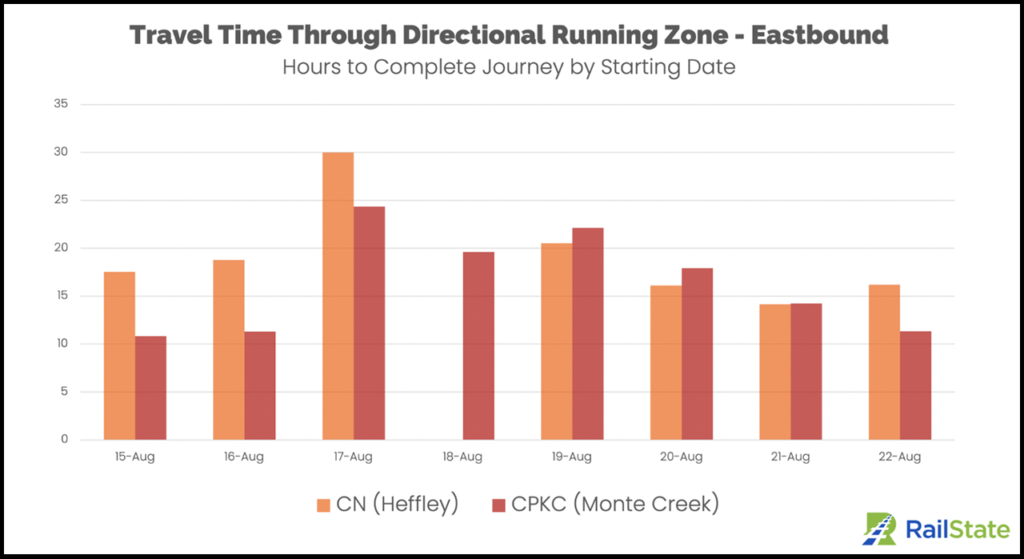
Only three eastbound trains started through the DRZ on the evening of Aug. 18, all on CPKC, according to RailState. No eastbound CN trains moved Aug. 18.
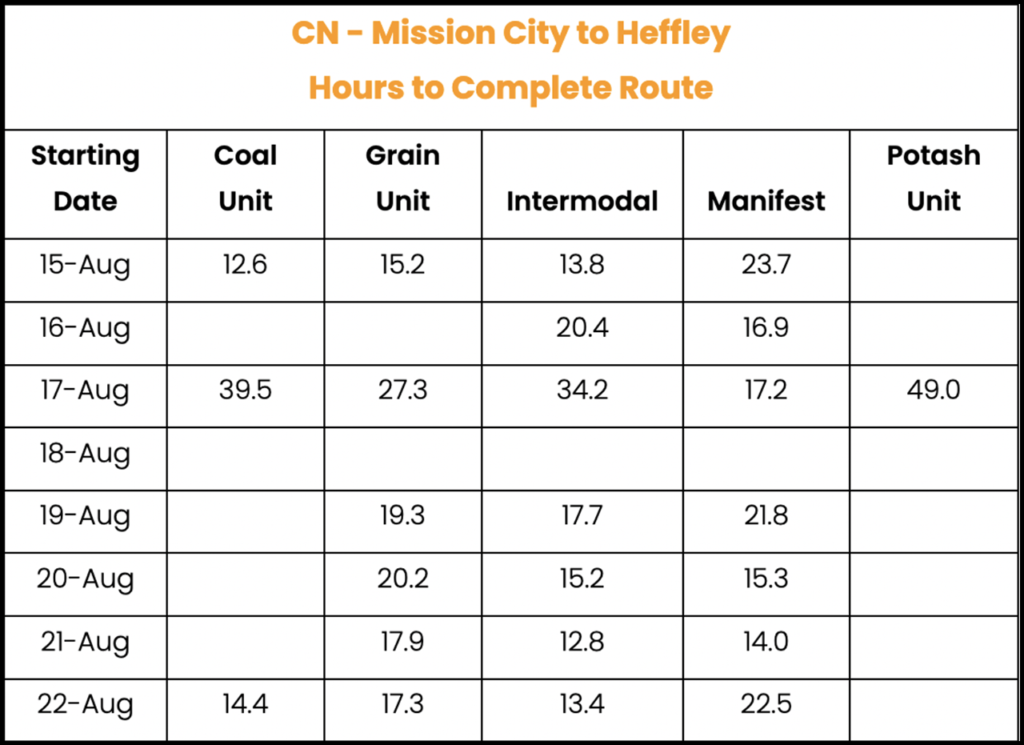
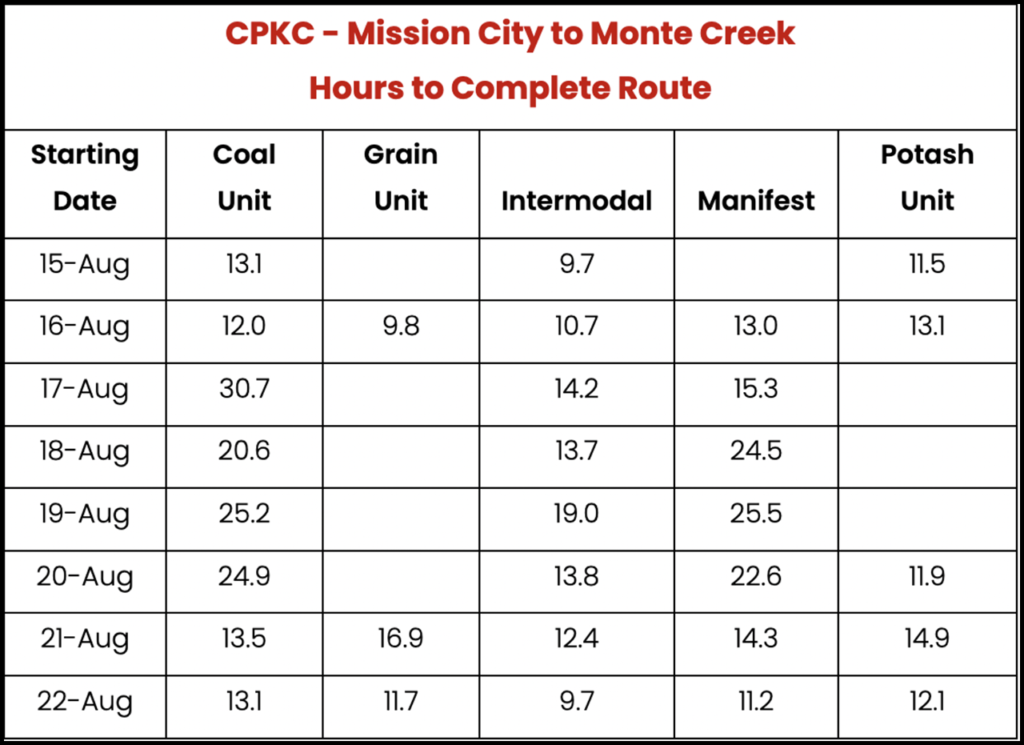
Fire Suppression Efforts
The railroads have been regularly deploying fire suppression cars throughout B.C, according to RailState, which said its sensors captured train images throughout the rail network (see images at the top of this article). These fire suppression cars were also seen moving on the network in early May, when widespread wildfires in Alberta caused an official state of emergency, the company said.
Aug. 24 Activity
“Wildfires in the Fraser Canyon area continue to burn and remain a threat to various communities,” RailState reported. “An evacuation order has been called for the Lytton area and Highway 1 remains closed to traffic.”
Although rail traffic through the DRZ has largely returned to normal in recent days, RailState reported, the railroads are actively working to keep the route secure for rail traffic. In the early morning hours of Aug. 24, there was a delay in traffic as a short train with a fire suppression car moved through the Drynoch area, the company noted.
An eastbound intermodal train traveled through Drynoch at 8:23 p.m. PDT on Aug. 23, according to RailState. Four hours later, it said, the train with a CPKC fire suppression car (pictured below) traveled westbound, against the flow of normal traffic on this route, at 12:19 a.m. PDT on Aug. 24. The next eastbound loaded train came through at 2:08 a.m. PDT on Aug. 24, followed closely by a manifest train and two intermodal trains, all within the next hour.

According to RailState, a “six-hour gap in eastbound trains is not unheard of for the DRZ but these service delays and additional resource strains from increased fire protection and maintenance needs highlight the challenges the railroads face.”
Further Reading:
RailState: Canadian Railroads ‘Close to Matching Volumes Seen Before B.C. Ports Strike’



